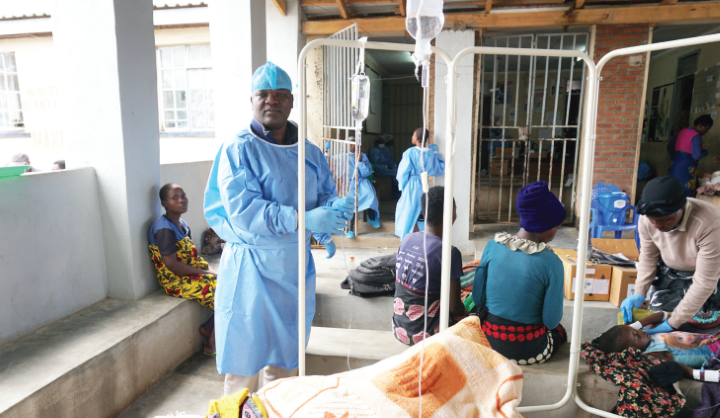Vertical farming: answer to land shortage
 Fifty-two-year old Elwin Lipholu from the southern Malawi district of Mulanje now breathes a sigh of relief because his future looks bright. He is assured of a good harvest on his small piece of land.
Fifty-two-year old Elwin Lipholu from the southern Malawi district of Mulanje now breathes a sigh of relief because his future looks bright. He is assured of a good harvest on his small piece of land.
Lipholu, from Sitolo Village in Traditional Authority Chikumbu, had a challenge of access to land which has been dealt with a new farming technology–vertical gardening.
With sacks, buckets and basins, Lipholu is able to grow different types of vegetables, including tomato.
A sack held vertically gets filled with soil premixed with manure. All the while, a pole is held in place in the middle so that the soil lands around the pole.
“We are focusing on manure because it retains a lot of moisture and promotes good waste management. One bag goes with a pail of manure mixed with three pails of soil,†explains Lipholu.
As you fill the sack, you rotate the pole in its position to help the soil settle around it so that when the pole is taken out, the soil is compact around the hole the pole leaves.
The hole is then filled with stones which later act as a sieve to distribute the water to all parts of the sack.
The stones are then covered with some soil.
It is the easiness and flexibility of the technique that attracted Lipholu to adapt it. To this, add the saving on land.
Imagine one bag is equivalent to a standard vegetable bed.
“The traditional land that I had is no longer enough to feed my family because over the years, it has been shared among the family.
“I had been thinking of leasing land but the cost was more than I could bear. I need the extra land to grow crops for business because the maize I grow in my garden is just to feed my family. So, when I learnt of vertical agriculture, I did not hesitate,†he says.
“To plant, you use a razor or a sharp knife to make horizontal openings through the sack and in there plant the seedlings. The planting stations, just like the rows, are 30cm apart,†he shares.
Vertical agriculture is a farming technology introduced to Mulanje by the Climate Change Adaptation Project that was run by the Chancellor College in collaboration with the University of Dar es Salaam, funded by the International Development Resource Centre.
The project took off in 2009 as part of a climate change adaptation in the area.
The method, touted for saving on water and manure, is ideal for places affected by land shortages, such as Mulanje.
Since he started vertical farming last October, Lipholu claims that his life has taken a sweeter twist, the proceeds from the venture, helping him to rear pigs, goats and chickens.
He says he chose to invest in animals because he wants to harvest animal waste for manure.
“With climate change in our midst, I believe that the vertical faming is the way to go; it cuts on water and manure is an effective alternative to fertiliser.
“The method also allows crops to be grown all year round. I am assured that there will always be a little something at home because I grow the vegetables all year through,†said Lipholu.
Apart from Lipholu, the technique has been adopted by several households in T/A Chikumbu who have organised themselves into farming groups.
Looking at the benefits, Mulanje District agriculture development officer (Dado) Noel Limbani says his office is contemplating to replicate the project to other areas.
Partly, he says, this is because rainfall figures in the district are falling and the land shortage continues to worsen with the growing population.
“Mulanje has about 200 000 farming families and land is becoming more and more scarce and rains have been poor in the last few years.
“We believe it is about time we adapted to the situation. Naturally, vegetables and fruits do well in Mulanje and this technique is more than ideal for our area,†says Limbani.
At implementation, the project took special interest in vegetable farming because a research by the implementing universities showed a reciprocally beneficial link between people in urban and rural areas; rural areas commonly earn a living by supplying urban dwellers with vegetables, a central part of their diet.
Because of climate change resulting in erratic rains and change in growing seasons, vegetables have not been easily available for middle class citizens and the rural ones are losing out on cash.
Looking at the results of the research, according to the project country coordinator, Merriam Joshua, it was important to improve the source, hence the introduction of the project in Mulanje and Chikhwawa.
She says they noted that the vulnerability of people in urban areas was more ignored than that of those living in rural areas
“There are so many ways in which people in urban areas are vulnerable but we chose to concentrate on the food linkage which is also a priority in the National Adaptation Programme of Action (Napa).
“We were running the project with University of Dar es Salaam. The results look promising and we will be looking into ways of scaling up throughout the nation.
“Because of erratic rains, maize has not been the best crop in the last few years and this is one way of moving from the traditional crop and looking at other options for adaption,†said Joshua.





